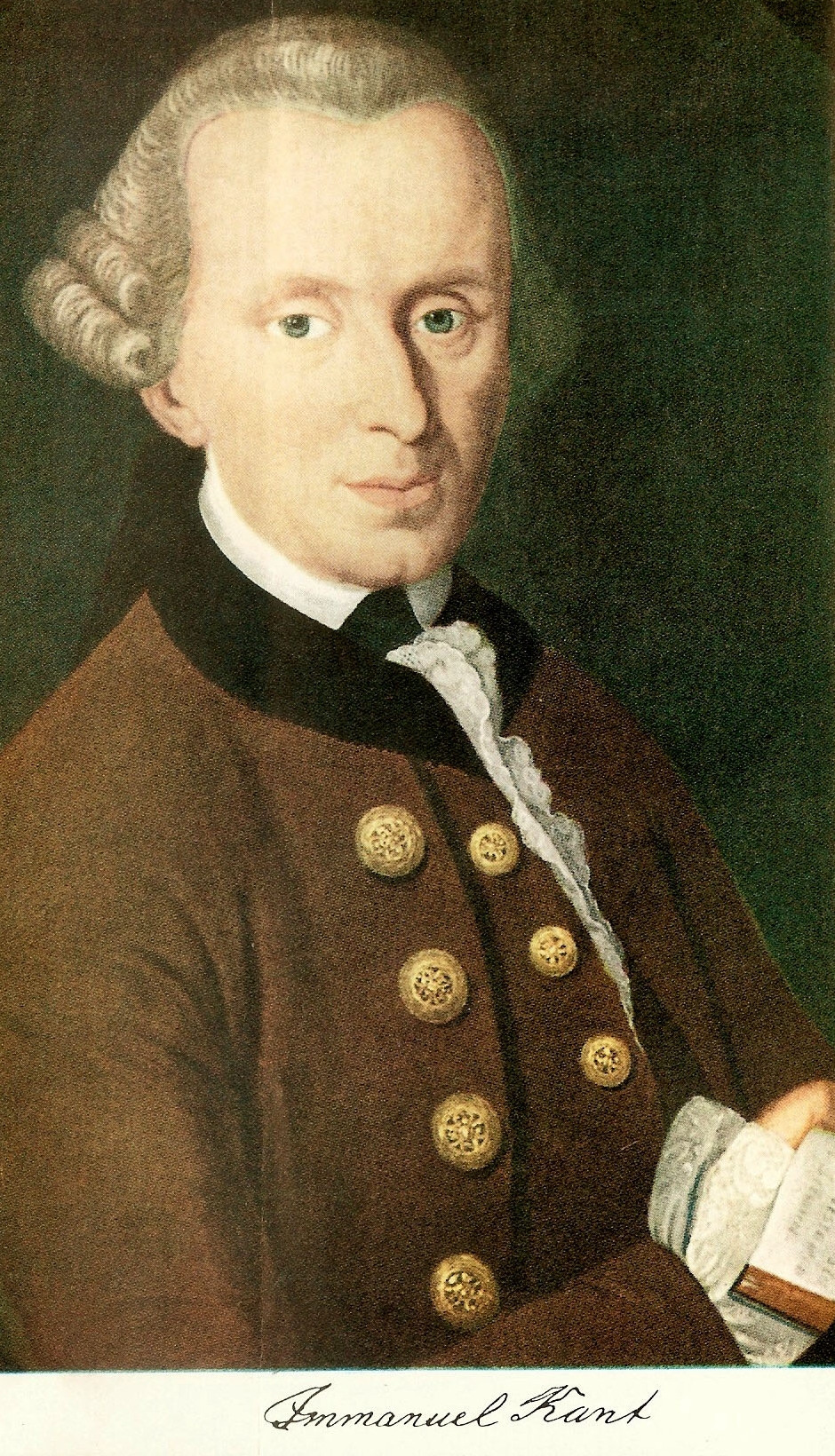“Lhomme acquiert la femme, le couple acquiert des enfants et la famille des domestiques.”
Métaphysique des mœurs, 1797, Doctrine du droit
Emmanuel Kant est un philosophe allemand, fondateur du criticisme et de la doctrine dite « idéalisme transcendantal ».
Né le 22 avril 1724 à Königsberg, capitale de la Prusse-Orientale, il y est mort le 12 février 1804. Grand penseur de l'Aufklärung, Kant a exercé une influence considérable sur l'idéalisme allemand, la philosophie analytique, la phénoménologie, la philosophie postmoderne, et la pensée critique en général. Son œuvre, considérable et diverse dans ses intérêts, mais centrée autour des trois Critiques, à savoir la Critique de la raison pure, la Critique de la raison pratique et la Critique de la faculté de juger, fait ainsi l'objet d'appropriations et d'interprétations successives et divergentes.

“Lhomme acquiert la femme, le couple acquiert des enfants et la famille des domestiques.”
Métaphysique des mœurs, 1797, Doctrine du droit
Fondation de la métaphysique des mœurs, 1785, Troisième section
Variante: Agis selon la maxime qui peut en même temps se transformer en loi universelle.
Fondation de la métaphysique des mœurs, 1785, Première section
Théorie et pratique - D'un prétendu droit de mentir par humanité, 1797
Critique de la faculté de juger, 1790
The Critique of Aesthetic Judgement
Critique de la faculté de juger, 1790
Fondation de la métaphysique des mœurs, 1785, Deuxième section
Fondation de la métaphysique des mœurs, 1785, Première section
La Critique de la faculté de juger (Critique du jugement esthétique): Une oeuvre fondamentale de l'esthétique moderne
Book IV, Part 1, Section 2, “The Christian religion as a natural religion”
Religion within the Limits of Reason Alone (1793)
What is Enlightenment? (1784)
Seventh Thesis
Idea for a Universal History from a Cosmopolitan Point of View (1784)
Die menschliche Vernunft hat hier, wie allerwärts in ihrem reinen Gebrauche, so lange es ihr an Kritik fehlt, vorher alle mögliche unrechte Wege versucht, ehe es ihr gelingt, den einzigen wahren zu treffen.
Groundwork of the Metaphysics of Morals (1785)
“I have no knowledge of myself as I am, but merely as I appear to myself.”
B 158
Critique of Pure Reason (1781; 1787)
“It is precisely in knowing its limits that philosophy consists.”
A 727, B 755
Critique of Pure Reason (1781; 1787)
Ninth Thesis
Idea for a Universal History from a Cosmopolitan Point of View (1784)
“All natural capacities of a creature are destined to evolve completely to their natural end.”
First Thesis
Variant translations:
All natural capacities of a creature are destined sooner or later to be developed completely and in conformity with their end.
All natural capacities of a creature are destined to develop themselves completely and to their purpose.
Idea for a Universal History from a Cosmopolitan Point of View (1784)
Seventh Thesis
Idea for a Universal History from a Cosmopolitan Point of View (1784)
Contexte: What is the use of working toward a lawful civic constitution among individuals, i. e., toward the creation of a commonwealth? The same unsociability which drives man to this causes any single commonwealth to stand in unrestricted freedom in relation to others; consequently, each of them must expect from another precisely the evil which oppressed the individuals and forced them to enter into a lawful civic state. The friction among men, the inevitable antagonism, which is a mark of even the largest societies and political bodies, is used by Nature as a means to establish a condition of quiet and security. Through war, through the taxing and never-ending accumulation of armament, through the want which any state, even in peacetime, must suffer internally, Nature forces them to make at first inadequate and tentative attempts; finally, after devastations, revolutions, and even complete exhaustion, she brings them to that which reason could have told them at the beginning and with far less sad experience, to wit, to step from the lawless condition of savages into a league of nations. In a league of nations, even the smallest state could expect security and justice, not from its own power and by its own decrees, but only from this great league of nations … from a united power acting according to decisions reached under the laws of their united will.
Part III : Selection on Education from Kant's other Writings, Ch. I Pedagogical Fragments, # 52
The Educational Theory of Immanuel Kant (1904)
Preface to 2nd edition, Tr. F. Max Müller (1905)
Critique of Pure Reason (1781; 1787)
Die Verehrung mächtiger unsichtbarer Wesen, welche dem hülflosen Menschen durch die natürliche, auf dem Bewusstsein seines Unvermögens gegründete Furcht abgenöthigt wurde, …
Book IV, Part 2, Section 3
Religion within the Limits of Reason Alone (1793)
Part II, pp. 212-213
Lectures on Ethics (1924)
Preface, Tr. Bax (1883) citing Isaac Newton's Principia
(1786)
Preface, Tr. Bax (1883)
(1786)
A lecture at Königsberg (1775), as quoted in A New Dictionary of Quotations on Historical Principles from Ancient and Modern Sources (1946) by H. L. Mencken, p. 1017
Part II, p. 146
Lectures on Ethics (1924)
“Happiness is not an ideal of reason but of imagination.”
Fundamental Principles of the Metaphysics of Ethics (1785)
As quoted in German Thought, From The Seven Years' War To Goethe's Death : Six Lectures (1880) by Karl Hillebrand, p. 207
Part Two : Metaphysical Principles of Virtue
Metaphysics of Morals (1797)
A 627, B 655 (Physico-Theological Proof Impossible)
Critique of Pure Reason (1781; 1787)
Variant translation: I freely admit: it was David Hume's remark that first, many years ago, interrupted my dogmatic slumber and gave a completely different direction to my enquiries in the field of speculative philosophy.
Prolegomena to Any Future Metaphysics (1783)